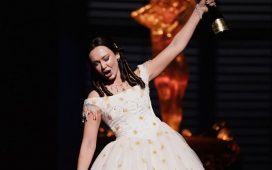The Age of Innocence (1993)
Along with Bram Stoker’s Dracula, The Age of Innocence represented a major turning point for Winona, at least in the industry if not her earliest fans’ admiration. Prior to working with Francis Ford Coppola and Martin Scorsese, she was seen as a favorite of the “kidz” in the eyes of many Boomers who ran Hollywood. After starring in a blockbuster like Dracula and, more impressively, a work of burning genius like The Age of Innocence, perceptions changed. She even earned the only acting Oscar nomination in a film where she starred opposite Daniel Day-Lewis.
Ryder, and so much else about The Age of Innocence, holds up too. Scorsese reveals the ardor of a true romantic in this exquisite adaptation of Edith Wharton’s book of the same name. But despite its title, Ryder may be the heart of the film’s true, bitter irony. Dismissed by everyone, including Newland Archer (Day-Lewis) as his lovely yet vacuous wife, Ryder’s May Archer will do any and everything to manipulate her foolish husband, and thwart his dreams of running away with her cousin (Michelle Pfeiffer) due to boyish fallacies about the power of true love. Ryder’s doe eyes smother Archer and the film in kindness, pulling the rug out from under the viewer in the third act when May, like Ryder, proves she’s an idol for her age. – David Crow
Reality Bites (1994)
Coming off three period dramas in a row (Dracula, The Age of Innocence and House of the Spirits), Ryder must have been delighted to face a costume rail of casual wear and no wigs on Reality Bites. Finally! A contemporary picture about a bunch of friends who’d be just like her, if only she wasn’t stratospherically famous and on the cover of every magazine in the newsstand.
A lot of ink has already been spilled over how far this frankly pretty mild love triangle rom-com can be said to define Gen X, so let’s skip past that and get on to the real power of Ryder in Reality Bites: her hair. That may be glib, but Ben Stiller’s directorial debut stands less as a work of art than a time capsule of early-’90s style. As wannabe documentarian Leilana, caught between yuppie Michael (Stiller) and slacker Troy (Ethan Hawke), Ryder and co-star Janeane Garofalo were a walking lookbook for a generation. They were also convincing and smart, and brought writer Helen Childress’ semi-autobiographical story to life with likeable charm, even if that soundtrack deserves to be nuked from orbit. – LM
Little Women (1994)
The Greta Gerwig Little Women is wonderful, but for those who grew up in the ‘90s, or simply prefer Louisa May Alcott’s story realized in its purest form, Gillian Armstrong’s 1994 adaptation remains the definitive take. There are many reasons for that, and high on that list is Winona Ryder’s Jo March, who like many of Ryder’s most loved characters, is another outsider and iconoclast who makes her way in the world by defying social convention.
Yet there is a joy and warmth to Ryder’s Jo, as well as the film she’s in, that is missing in other interpretations, as well as Ryder’s collection of other strange and unusuals. There’s also the most pronounced sisterhood of any adaptation between a cast that also includes Claire Danes, Kirsten Dunst, Trini Alvarado, and Susan Sarandon. The sheer affection these performers have in each other’s company, and the authenticity of Armstrong’s world-building makes this irresistible, even before you add perhaps Thomas Newman’s greatest score. Throw in sizzling chemistry between Ryder and Christian Bale at his most carefree, and you understand why a whole new generation grew up heartbroken over Jo and Laurie’s unconventional ending. Ryder probably should have won the Oscar on this one. – DC












